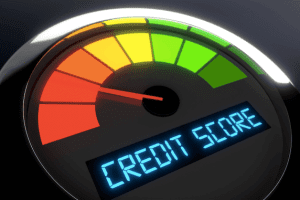Typically, closing down a bank account will not affect your credit score. However, it can damage your rating if you terminate a bank account with a negative balance. This is when you have a bank account overdraft whereby your balance has gone below zero.
According to the credit reference bureau Experian, approximately 16% of Americans have bad credit scores. With this in mind, Dollar Hand reveals the best way to close your bank account without risking harming your score.
What Is A Credit Score?
A credit score is a numerical rating which determines your creditworthiness. It is calculated via your credit report which details your financial history and debt repayments.
A credit score is important as it indicates how reliable you are when it comes to financial dealings. In turn, this influences whether you are able to borrow money or credit in the future, as well as how favorable your terms are such as interest rates. A poor credit score can also sometimes impact your ability to rent an apartment or buy a property, apply for insurance, purchase a car or secure a job.

How Do I Close A Bank Account?
There are four simple ways to close your bank account:
- Visit a local bank branch
- Call your bank’s customer service
- Submit a written cancellation request via a letter
- Email a representative
Before going ahead with the closure, you should contact the bank to double check you do not have a negative balance. You must also take into account any pending transactions or upcoming payments that may hit the account after you have closed it or bring the balance to negative after you have transferred your money out of the account. In this case, leave some money behind for these payments or move over your direct debits to another bank account as quickly as possible.
The bank may send you an email confirmation of the closure. If not you can speak to a bank representative and request confirmation in writing that the account has been closed.
It is also important to note that some banks or credit unions may charge a fee for early closure if you want to close your account very soon after opening it. This is usually up to 180 days after it has been set up.
Will Closing A Bank Account Affect My Credit Score?
No, closing a bank account should not affect your credit score if the account is clear of any unpaid debts. It is only possible for the closure of your bank account to affect your rating if the account has a negative balance when it is closed. You must therefore ensure the account is terminated in good standing by settling any unpaid balances.
If you fail to pay off debts, the bank could send your overdraft to a collection agency. The collection agency may choose to report this unpaid amount to the credit bureaus which could then be filed on your credit report for 7 years and in turn have a negative effect on your credit score for this time period, regardless of whether you pay it off or not.
Leaving a negative balance on a closed account could also make it more difficult to get approved for an additional bank account in the future. In this case, you may have to apply for a second-chance bank account or a prepaid debit card.
How Can I Improve My Credit Score?
If you fail to get rid of your overdraft when closing your account and in turn damage your credit score, then there are some simple steps you can take to boost your rating again. Settling any existing debts and paying all your future bills on time will certainly stand you in good stead. You can also check your credit report to see if there are any errors or fraud which could be affecting your score.
To improve your credit score, you could join the electoral register as this is an easy way to confirm your identity and boost your reliability. Closing down any unused credit cards should also help.

Concluding Thoughts
If you are worried that closing your bank account could harm your credit score, then don’t be! As long as you practice good banking habits and take a few simple steps to ensure that you will not leave a negative balance, then you should have no problem in maintaining your current credit score.
Was this article helpful?
Justine is a full-time writer with lots of expertise and a wealth of experience in the financial world. In particular, she specializes in household income and consumer finance across the United States. Follow her articles for useful advice and top tips, guides on how to save money and lots more.
